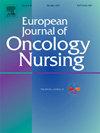乳腺癌患者的恢复力与睡眠质量之间的纵向联系。
IF 2.7
3区 医学
Q1 NURSING
引用次数: 0
摘要
目的:估算新确诊乳腺癌患者在最初6个月内的恢复力与睡眠质量之间的纵向关系:在 2023 年 7 月至 2023 年 9 月期间,招募了 155 名新确诊的乳腺癌患者参加 "乳腺癌抗逆力 "项目(简称 BRBC)。他们完成了 10 项康纳-戴维森复原力量表和匹兹堡睡眠质量指数量表。数据收集设置了三个时间点,包括初次诊断后 1 个月(T0)、3 个月(T1)和 6 个月(T2)。数据分析采用交叉滞后面板模型(CLPM)和平行潜增长模型(PLGM):排除了大量缺失项目的问卷,最终纳入了 125 名患者,回复率为 83.3%。CLPM表明,T1时的恢复力预测T2时的PSQI(r = -0.168,P < 0.001),T1时的PSQI预测T2时的恢复力(r = -0.112,P < 0.001)。PLGM表明,恢复力的变化与PSQI的变化有显著相关性(r = -0.874,P< 0.001):结论:在新诊断的乳腺癌患者中,复原力与睡眠质量之间的纵向联系得到了证实。复原力是睡眠质量发展的保护因素。本文章由计算机程序翻译,如有差异,请以英文原文为准。
The longitudinal association between resilience and sleep quality in breast cancer
Purpose
To estimate the longitudinal association between resilience and sleep quality in patients with newly diagnosed breast cancer within the first 6 months.
Method
Between July 2023 and September 2023, 155 newly diagnosed BC patients were recruited to participate in the Be Resilience to Breast Cancer program (Abbreviated as BRBC). They completed the 10-item Connor-Davidson Resilience scale and Pittsburgh Sleep Quality Index Scale. The following three timepoints were set to collect the data, including 1 month after initial diagnosis (T0), 3 months (T1), and 6 months (T2). Data were analyzed using Cross-lagged Panel Model (CLPM), and Parallel Latent Growth Model (PLGM).
Results
Excluded questionnaires with a large number of missing items and finally 125 patients were included, with the response rate of 83.3%. CLPM indicated that resilience at T1 predicted PSQI at T2 (r = −0.168, P 0.001), and PSQI at T1 predicted resilience at T2 (r = −0.112, P 0.001). PLGM demonstrated that changes in resilience was significantly associated with changes in PSQI (r = −0.874, P 0.001).
Conclusion
A longitudinal association between resilience and sleep quality was confirmed in patients with newly diagnosed breast cancer. Resilience was a protective factor in the development of sleep quality.
求助全文
通过发布文献求助,成功后即可免费获取论文全文。
去求助
来源期刊
CiteScore
4.40
自引率
3.60%
发文量
109
审稿时长
57 days
期刊介绍:
The European Journal of Oncology Nursing is an international journal which publishes research of direct relevance to patient care, nurse education, management and policy development. EJON is proud to be the official journal of the European Oncology Nursing Society.
The journal publishes the following types of papers:
• Original research articles
• Review articles

 求助内容:
求助内容: 应助结果提醒方式:
应助结果提醒方式:


